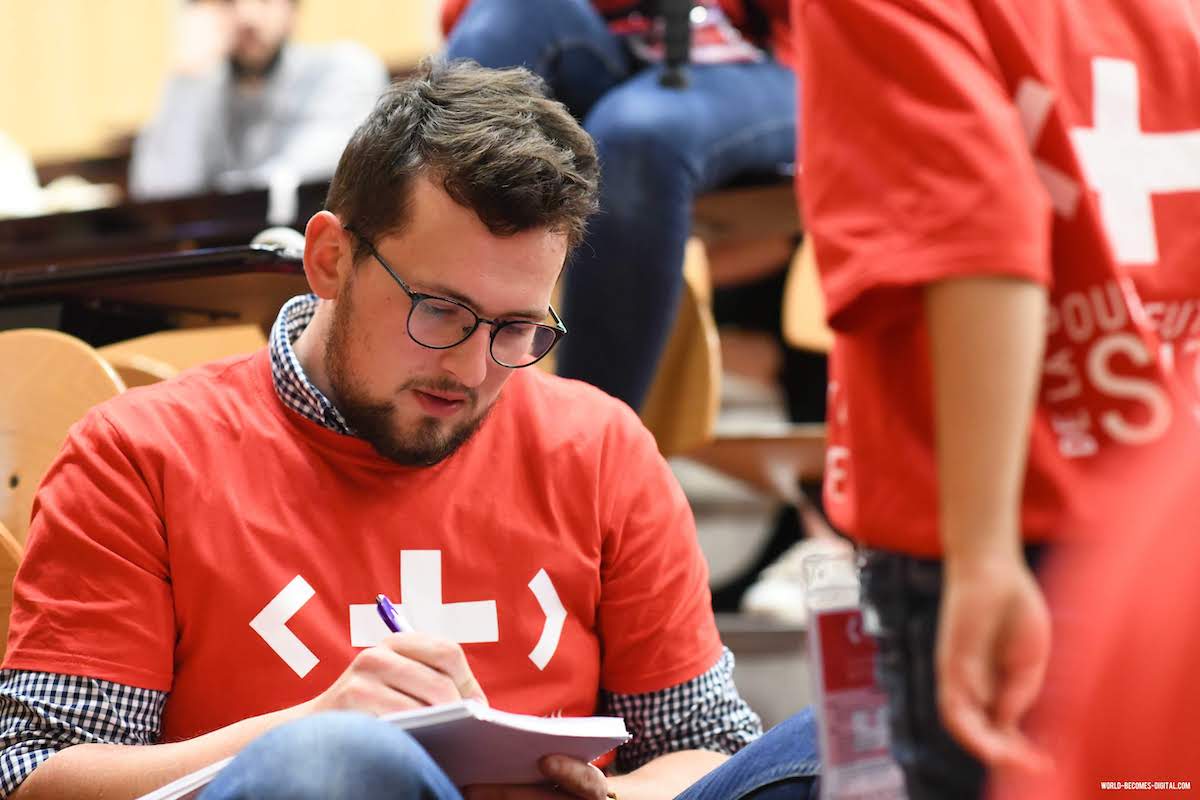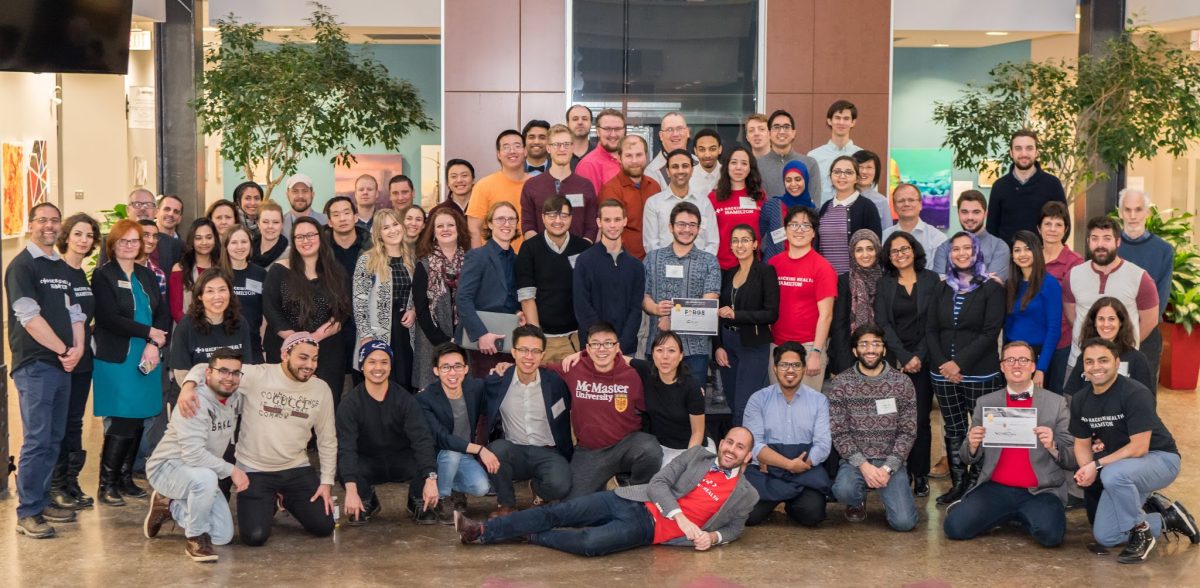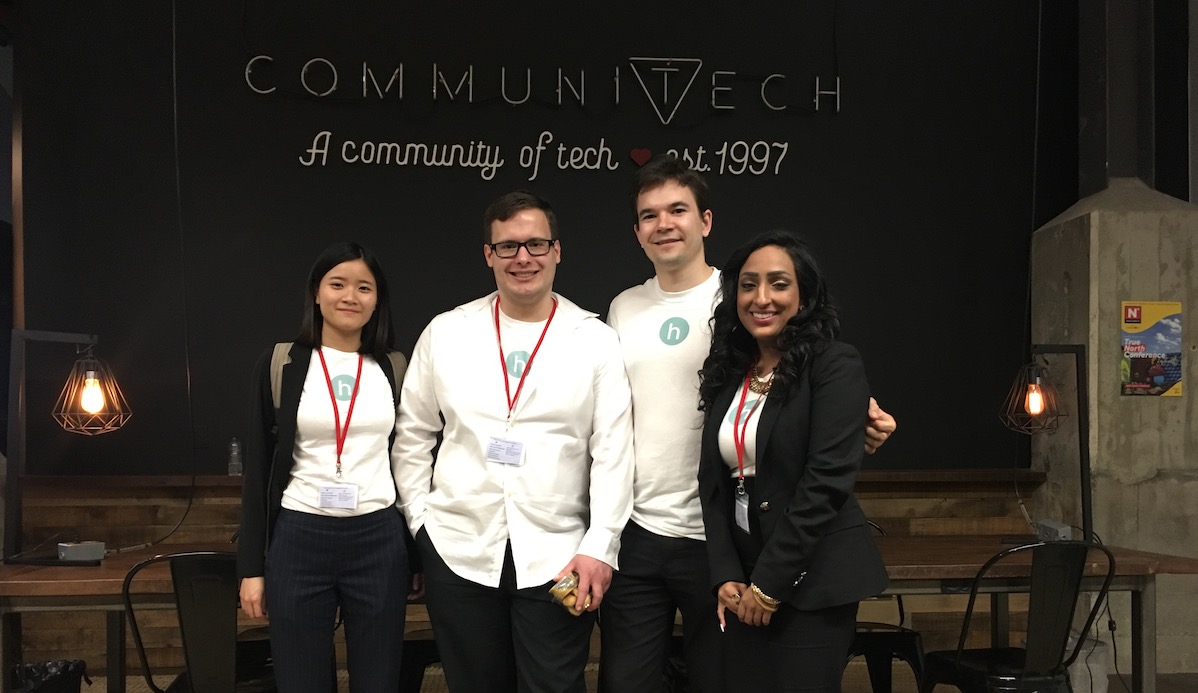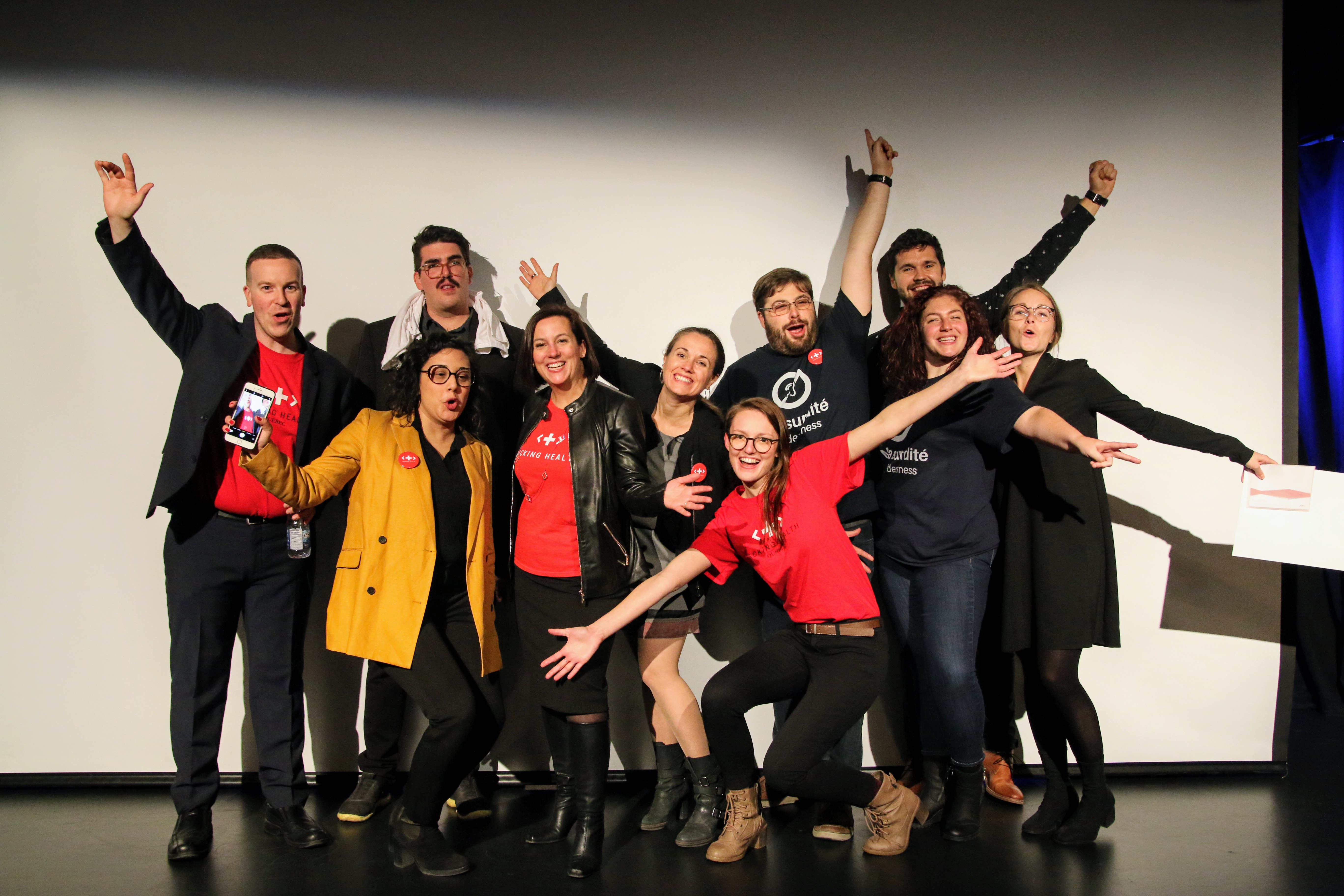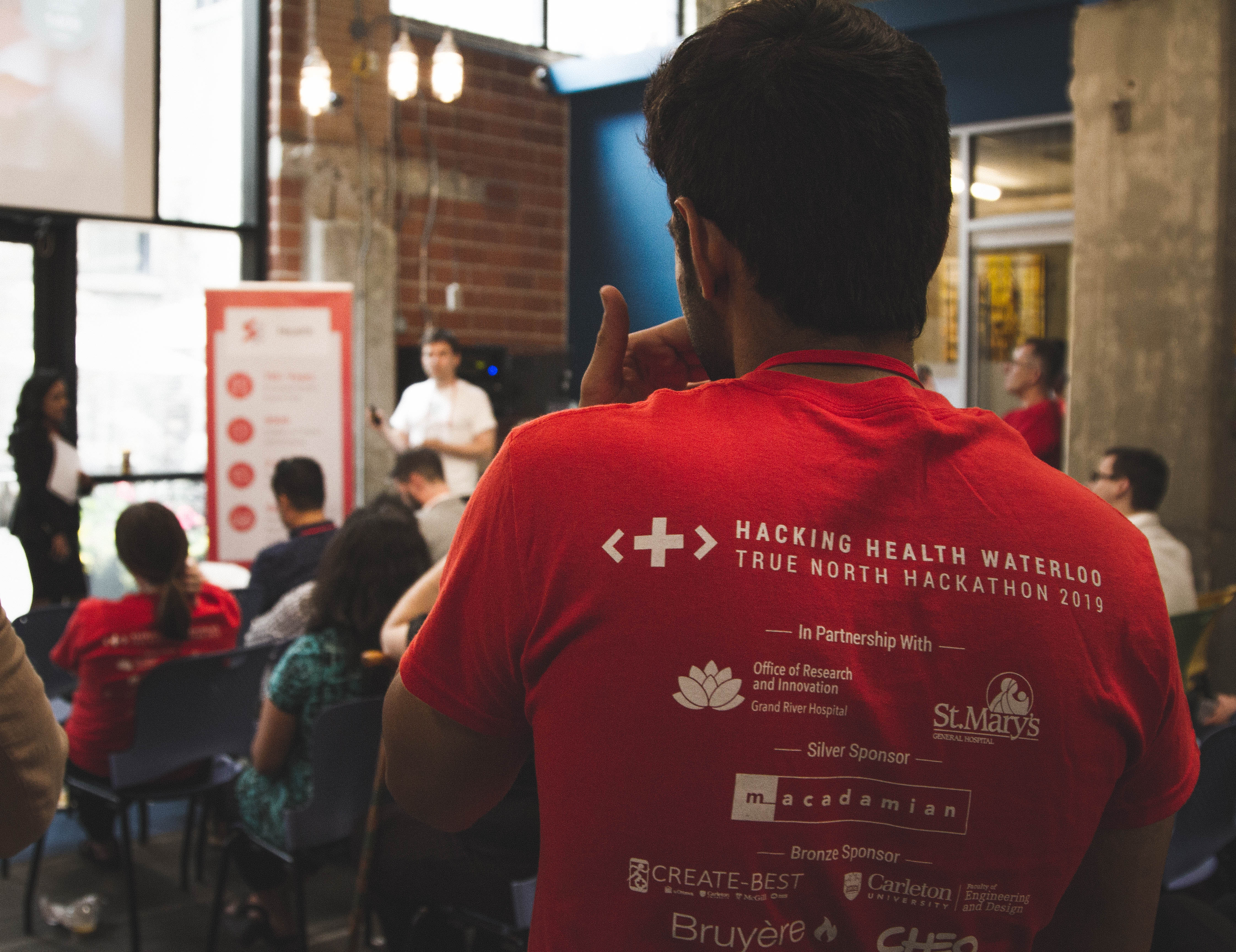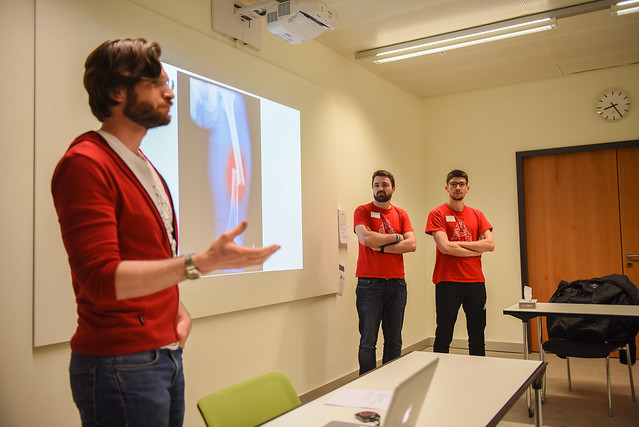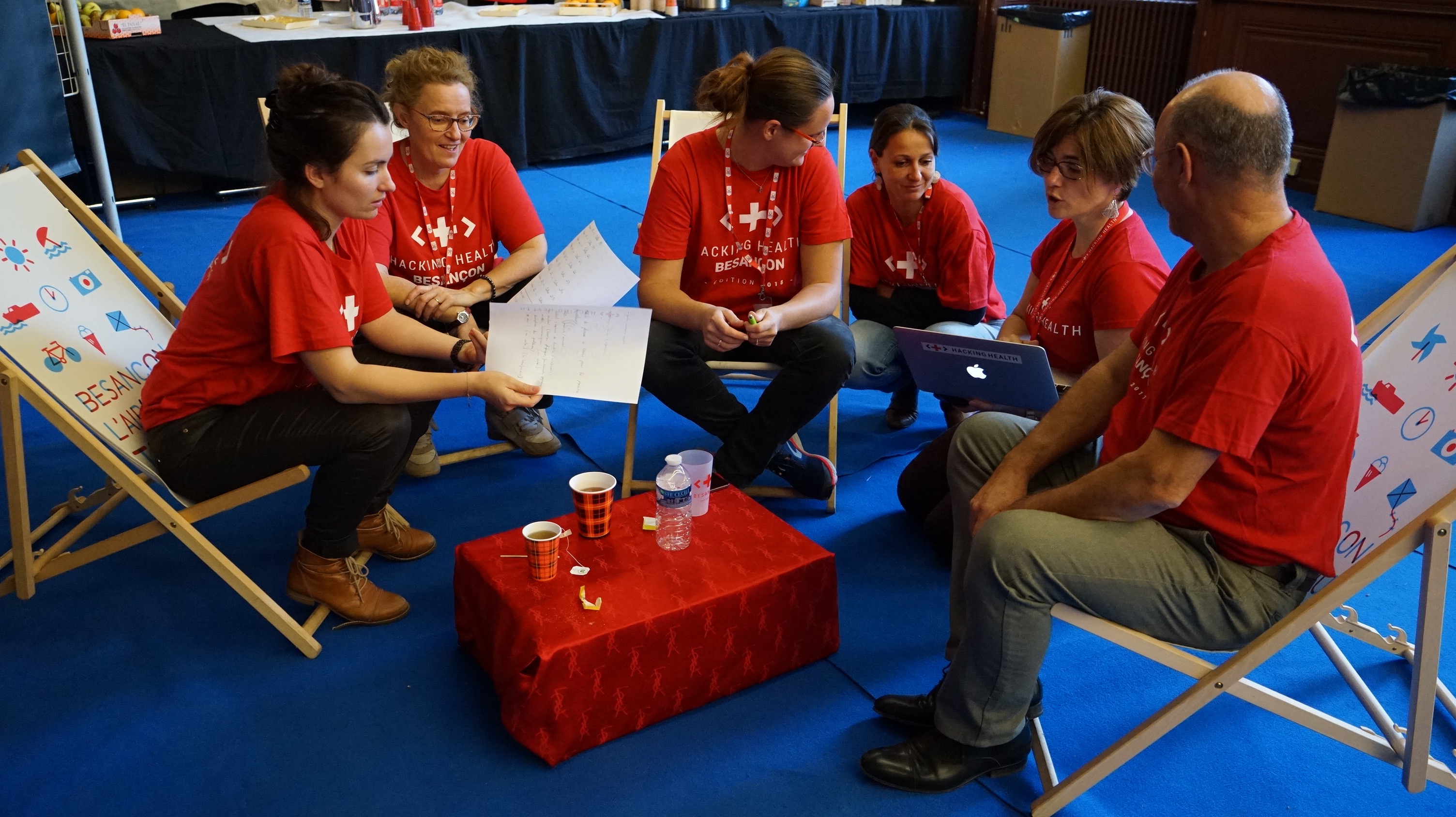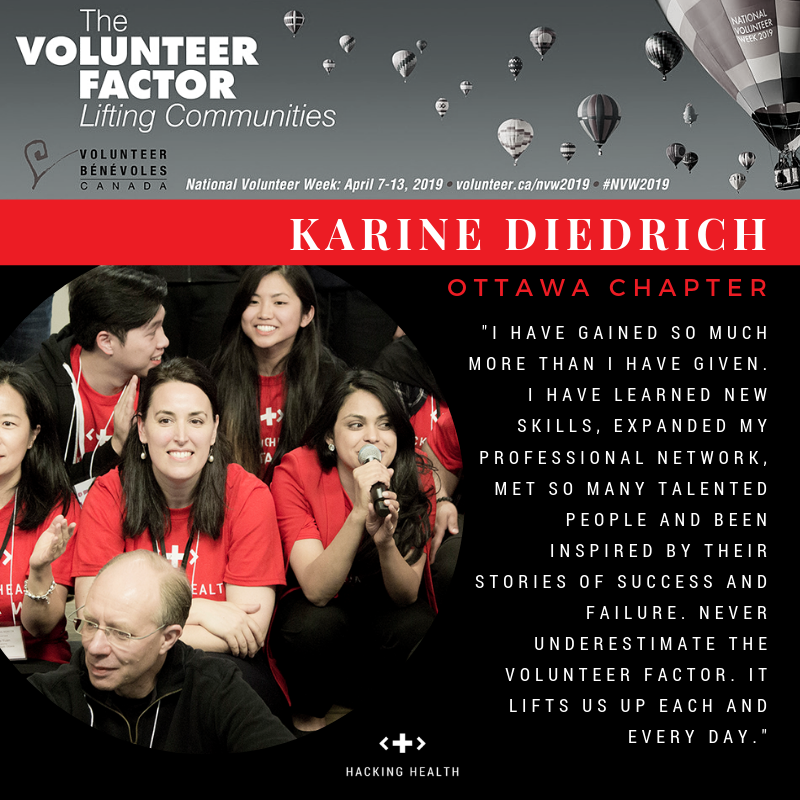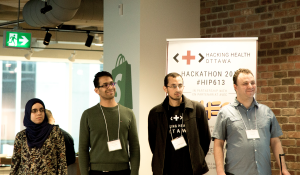2019
150 hackathons and just getting started
Hacking Health: Bottom-up Innovation for Health article from July 2012 in Technology Innovation Management Review noted how top-down government approaches to health have failed to deliver digital technologize to modernize healthcare. “Disruptive innovation must come from the ground up by bridging the gap between frontline health experts and innovators in the latest web and mobile technology,” wrote Jeesham Chowdhury.
Here we capture this grass-roots initiative grew to an international movement, as we celebrate the 150th hackathon in Hamilton, Ontario.
Hamilton marks 150th hackathon milestone for Hacking Health
When Hacking Health started in 2012 in Montreal, it would have been inconceivable that seven years later, it would have orchestrated 150 hackathon events. It will be the 58th Hacking Health hackathon in Canada across 18 cities since 2012.
The academic institutions of Hamilton and the synergistic network of facilities make it an ideal place to host this 150th Hackathon. Join us at McMaster Innovation Park on November 8-10.
ExperifyHealth | Working to Overcome Social Isolation in Facilities
ExperifyHealth exemplifies the novel experience of many teams at a hackathon. Dr. Jonah Marek, Physician at Bruyère, explains first-hand their experience and reflections from the dual-city hackathon series, in conjunction with True North.
HHQc, the Missing Link to Health Innovation in Quebec City
— Lire l’article original en Français —
Hacking Health Quebec is considered as a mature chapter of the movement. Born in 2016, this chapter has already seen ups and downs and had to pivot – just like many startups born from the same movement – to meet the real needs of the ecosystem in Quebec City.
Way too many solutions are abandoned once the euphoria of the competition is over
It was during the strategic meeting of summer 2018 that we realized the evidence. Hackathons and Coopérathons are extraordinary events that allow prototyping an innovative solution to a real problem in healthcare, but … this is not enough. Too many of these solutions are abandoned once the euphoria of competition has passed. Most persevering teams face problems of cash flow, lack of knowledge of regulations of the health system, and also contacts in the community to validate their concept or find investors who will support their project. Incubator, investors, specialists of all kinds, all structures are already present, but do not often meet and speak together. The solution is in the community! We need to break silos and create connections between the different stakeholders of our ecosystem.
Our mission is clear:
Create a community to support health care innovation in Quebec City.
The Cooperathon kept us busy throughout fall, and we decided to start in February a series of meet-ups with different themes. In the form of a happy hour, we invite either a panel to debate around a topic, or experts to expose the latest trends in their field. Also, an entrepreneur is invited to present his innovative project in health care and exposes his/her struggles to the audience to get advice and contacts. We close with a networking session that allows everyone to meet and continue the discussion in a friendly atmosphere.
A series of meet-ups to bring the community together
The theme of the first meet-up was evident to us: since we want to support the projects born of our events, we need to invite previous project holders to come and share their experience and their learnings. We organized the Alumni Forum at Le Camp, an incubator / accelerator which is one of our partners. Four alumni immediately responded to our proposal: Kim Auclair (My Deafness project), Marie-Lou and Mathieu (Braver Health project), Schallum Pierre (Blockchain Citiz project) and Alain Larouche (ABC Santé project, now Concerto + of the Concerto Health group). The panel worked wonderfully, with Schallum Pierre in video conference from Montreal. Our audience was particularly interested in the journey of these entrepreneurs with a benevolent curiosity. All understood that everyone could make an impact by contributing with their experience and expertise.
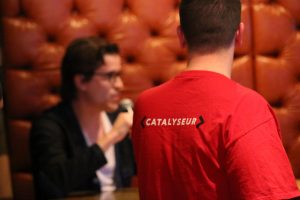 The second meet-up took place in April, as part of the Digital Week in Quebec City. For the second consecutive year, the meeting was held at the Korrigane for a casual atmosphere around the theme “Concrete Practices of AI in Healthcare.” Then, Julie Bastien took the floor to present her company Lixi and the difficulties she faces to put her software on the market. Julie received a lot of support from the audience, and the networking session allowed her to connect with many people.
The second meet-up took place in April, as part of the Digital Week in Quebec City. For the second consecutive year, the meeting was held at the Korrigane for a casual atmosphere around the theme “Concrete Practices of AI in Healthcare.” Then, Julie Bastien took the floor to present her company Lixi and the difficulties she faces to put her software on the market. Julie received a lot of support from the audience, and the networking session allowed her to connect with many people.
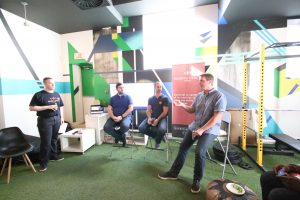
Finally, for the third meet-up, we wanted to get closer to the community of developers to raise their awareness about healthcare. Naturally, we went to meet the team of Spektrum Multimedia to integrate into the SPK ecosystem. We received a warm welcome and real support in the organization of our event. They also suggested one of their developer who works for Umano Medical, a company that creates smart hospital beds. We completed the panel with two other developers in healthcare. Organizing the meet-up in SPK’s offices has allowed us to break the silos that usually exist between healthcare and developers. From a panel of experts, the debate has turned into an exchange of ideas between developers, health professionals (doctors, pharmacists), entrepreneurs, investors in an amiable atmosphere.
Transforming institutions
Our reputation has begun to spread and we were proposed to lead a Design Thinking workshop as part of a Franco-Canadian Summer School in Management and Health Service organized by the Faculty of Sciences of the Administration of Laval University in June. This training was offered to managers, executives and students who wanted to improve the concrete organizational practices of healthcare institutions. We wanted to make them aware of the need to include a patient-partner in the development of concrete solutions in healthcare. In the form of a role-play, the participants developed solutions that take into account the user (patient) experience and were conquered by the approach.
This is just the beginning
We are now comforted by our idea that Quebec City needs a connector that knows how to bring together all those who want to have an impact in healthcare and support entrepreneurship in a highly regulated field, whatever the maturity of the company concerned.
In addition to the Coopérathon, we will offer other types of events to promote health innovation such as a Design Jam (a Design Thinking workshop) during the Entrepreneurship Week and a hackathon of 48 hours on the weekend during the Digital Week 2020. We will continue to offer meet-ups in parallel thanks to a growing team. The 2019-2020 program is going to be rich!
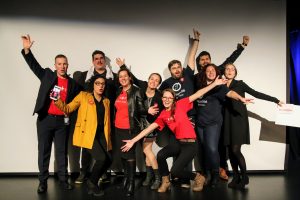
Save the dates:
Sep 24: Pitch & Networking Evening (preparation for the Coopérathon and Design Jam) – Registration
Oct 2 – Nov 2: Coopérathon competition – Registration
Nov. 20: Innovative Health Projects Workshop – Upcoming Entries
April 17, 18, 19, 2020: hackathon – Registration coming soon
——
Author: Delphine Davan, co-leader of the Quebec chapter.
The Waterloo Region’s Connector
In Canada, Kitchener-Waterloo is often described as the Silicon Valley of the North as an incubator for technology. Despite the accolades, we operate within a fragmented health tech siloed ecosystem. Waterloo Region has many incredible incubators, entrepreneurs, research bodies, and healthcare systems. Yet, inefficient communication leads to duplication and missed opportunities for growth.
Our vision for Hacking Health Waterloo is to be the recognized connecto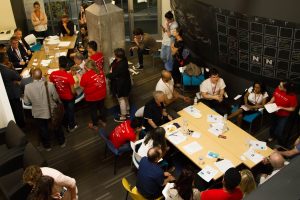 r for health tech innovation and improvement in the Region. We facilitate or enable conversations. We endeavour to create a bridge and conduit for more than 1,000 members to seek help and explore the unmet needs in health.
r for health tech innovation and improvement in the Region. We facilitate or enable conversations. We endeavour to create a bridge and conduit for more than 1,000 members to seek help and explore the unmet needs in health.
Our vision is to be the recognized connector for health tech innovation and improvement in the Region.
Kitchener-Waterloo is bustling with health tech-related conferences and Hackathons. Through 2018, these included Hack4Health 4.0 at St Paul’s Greenhouse, Waterloo MedTech conference and an AGE-WELL workshop on technology solutions to social isolation in older adults. May’s True North conference at Lot42 attracted more than 2,000 delegates considering Tech for good. Transformative innovation starts by connecting technology creators, healthcare professionals, and health consumers across the Waterloo Wellington Local Health Integration Network (WWLHIN).
Acting as a regional connector extends behind the geographic boundaries to plug the local community into the broader Ontario and Canadian health tech ecosystem. To that end, the Hacking Health Waterloo members have participated in the Hacking Health Ottawa HIP613, Hacking Health Toronto Ideathon, and new Hacking Health YGK chapter (Kingston, ON).
We can learn from each other through the Hacking Health network.
We have work ahead of us to engage more clinicians and engage patients to collaborate on realistic, human-centric solutions to front-line problems. We can learn from each other through the Hacking Health network. There are few situations that one of the other chapters have not previously encountered.
I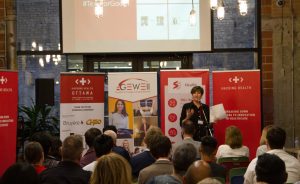 t has never been easier to start a business says HubSpot, while at the same time acknowledging that scaling a business is becoming harder than ever. Anthony Lacereva notes that Canada is possibly the best place to start a business and the hardest place to grow one. An exemplary illustration is the HHOttawa HIP613.
t has never been easier to start a business says HubSpot, while at the same time acknowledging that scaling a business is becoming harder than ever. Anthony Lacereva notes that Canada is possibly the best place to start a business and the hardest place to grow one. An exemplary illustration is the HHOttawa HIP613.
In 2019, Hacking Health Waterloo has collaborated with the Regional Innovation Centre, Communitech, for a hackathon in conjunction with True North. This event has engaged local health players while inviting partners from across Ontario. The theme was focused on Aging, Social Isolation, and Health. More details about this dual-city hackathon will be shared in a future post.
Our hackathons, therefore, must not just create the best ideas but provide a journey to scale profitable growth.
—–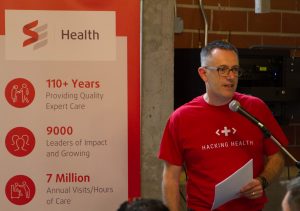
About the author: John Gregory is Partner Lead of the Hacking Health Waterloo chapter and Head of Global Growth at the Hacking Health Foundation.
Swiss Hacking Health: The Secret Of An Amazing Longevity
After five successful editions, Arkathon, the Hacking Health Switzerland-Valais‘ hackathon is one of the most important health hackathons in Switzerland. A must for the country’s disruptive minds!
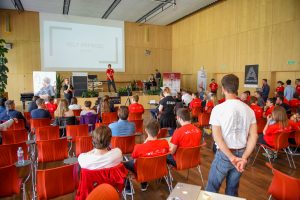 How does such an event work? Immersed in a medical facility over a weekend, participants meet with health professionals and patients to develop innovative solutions to solve their health challenges. At the end of these 48 intense hours, the objective is to present a jury of experts concrete digital solutions to address health issues. Each year, the three winners are followed by an acceleration program offered by The Ark Foundation and Swiss Digital Health.
How does such an event work? Immersed in a medical facility over a weekend, participants meet with health professionals and patients to develop innovative solutions to solve their health challenges. At the end of these 48 intense hours, the objective is to present a jury of experts concrete digital solutions to address health issues. Each year, the three winners are followed by an acceleration program offered by The Ark Foundation and Swiss Digital Health.
>> Discover the after movie of the last Arkathon’s edition
A robust ecosystem: a work over the years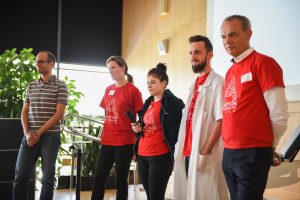
In the tradition of Hacking Health’s events, Arkathon infused its spirit of innovation and create strong synergies between very diversified stakeholders: academics, institutes and health professionals, patient associations, industry, start-ups,… Partnerships have been created over the years between the actors of digital health innovation: The Ark Foundation, Swiss Digital Health, the Clinique Romande de réadaptation, the Valais hospital site, the HES-SO Valais/Wallis, EPFL Valais/Wallis, GRIMM, the Institut de Recherche en réadaptation, etc.
>> Discover the interviews of the jury about the last Arkathon’s edition
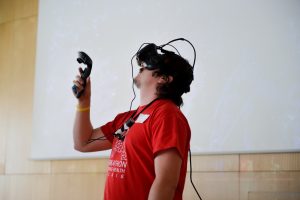
“This type of events accelerates projects and immediately detects their technical feasibility and economic potential,” explains Sébastien Mabillard, organizing member of Arkathon HH Switzerland – Valais. ” For the past 5 years, acceleration programs have been offered to hackathon winners by Swiss Digital Health and the Ark Foundation. It’s a way to get these nuggets to market quickly. Our objective is to encourage the emulation of projects with our partners and to support solution providers to “feed” the innovation cluster with viable prototypes to quickly respond to the needs of the field. “
Many success stories around the Arkathon of Hacking Health Valais
Recently, a start-up company, Transcend, created by three Valais computer science students, has developed an innovative training tool for high-tech rescue, based on virtual reality technologies. Another hat off to the start-up Eyeware, which has just raised a significant sum of €1.9 million for its eye-tracking system. These two solutions have hatched during previous editions of the Arkathon and are now shining on national and international markets!
>> Discover the interview of three winners’ teams of the last Arkathon’s edition
Join the community and hack tomorrow’s health !
Curious about our event? Do you want to participate in the 2020 edition and contribute its extraordinary longevity with us? Click here to find more information.
Our team of 4, Sébastien Mabillard, Nadia Mottier, Joël Rossier and Frédérique Décaillet, is looking forward to welcoming you to the Valais Alps!
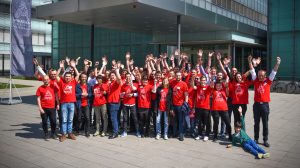
Hacking Health Hackathon, by Besançon (France)
—– Retrouvez l’article original en français —–
On October 2018, the Hacking Health chapter of Besançon organized its second health hackathon (open innovation marathon). This event confirmed the enthusiasm raised by the first edition, and highlighted three strong trends: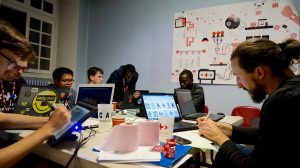
– A vast majority of students participated in the marathon: 75% of the 309 participants came from the local university or the “grandes écoles” (renowned engineer and business schools). This massive mobilization of students generates extraordinary energy, creativity, and generosity.
– The expertise of the local ecosystem is well represented: Microtechnology and miniaturization, a specialty inherited from the watch industry of which Besançon is a leader. Thus, many highly skilled engineers have joined teams composed of digital developers, electronic specialists, and designers.
– An important fablab (Fabrication Laboratory) gathering all the material and human resources of two fablabs and two engineering schools allowed to prototype operational devices in less than 48 hours.
extraordinary energy, creativity, and generosity
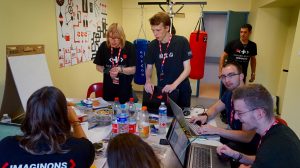 In this context, all the 24 health professionals and patients who came to pitch their issue have found a team. No team gave up during the weekend, and the quality of the solutions was terrific. This may explain that, two months after the marathon, two project holders are about to create their startup. Since this cannot be done overnight, we created a 3-month incubator program after the hackathon to assist teams in the maturation of their projects and help them connect with the right partners.
In this context, all the 24 health professionals and patients who came to pitch their issue have found a team. No team gave up during the weekend, and the quality of the solutions was terrific. This may explain that, two months after the marathon, two project holders are about to create their startup. Since this cannot be done overnight, we created a 3-month incubator program after the hackathon to assist teams in the maturation of their projects and help them connect with the right partners.
Another novelty in 2018: the creation of a showroom, in parallel with the innovation marathon. Seventeen French and Swiss Hacking Health project leaders came to present their innovation to the public, share their experience, and expand their network.
Join the 2019 hackathon in Besançon
– Or find the nearest Hacking Health event –
Would you like to participate in the 3rd Open Innovation Marathon of Health in Besançon? Would you enjoy prototyping solutions to respond to real problems posed by health professionals and patients? What about an exciting and entertaining weekend based on cooperation and exchange?
Join the Hacking Health hackathon in Besançon from 18 to 20 October 2019 and imagine tomorrow’s healthcare solutions!
———- Author: Christophe Dollet, Leader of the Hacking Health chapiter in Besançon and Coordinator of France-based chapters. Christophe works at Smart City, a project of the city of Besançon.
Watch this video to get a feeling of the 2018 hackathon in Besançon.
The Volunteer Factor
I joined the Hacking Health Ottawa (HHO) chapter in August 2016. I was working in health at the time and looking for new ways to bring together diverse stakeholders. I came across a post on Twitter about this thing called a Hackathon, and it was focused on health. I reached out to learn more and was invited to the chapter team meeting and a smaller event they had coming up. It was a great way to learn about Hacking Health, the people who make it all happen, and the work they do.
I came across a post on Twitter // I reached out to learn more
Throughout those first few weeks, I met students and professionals of all ages working in health, design, engineering, business, and government. The diversity of event participants was reflected in the make-up of the HHO team. The quality of speakers, engagement of participants and dedication of the chapter’s volunteers was inspiring. I still didn’t really understand what a developer did or how ‘ideation’ was different from ‘brainstorming,’ but it didn’t matter.
This was a learning journey, and it culminated in a three-day event each year called a hackathon, where a DJ is a must, energy is contagious, and people don’t want to leave (seriously…we had to kick people out at the end of each day).
There is always a moment during our events where someone realizes HHO is 100% powered by volunteers.
There is always a moment during our events where someone realizes HHO is 100% powered by volunteers. Even though we 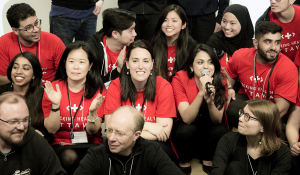 thank and recognize our volunteers at the beginning and end of every event, it can often take folks a few events for it to really sink in. Their eyes light up, and they can’t believe it. You do all this in your spare time the say. Yes, we do. We work with amazing, dedicated people who show up, roll up their sleeves and make the impossible possible year over year. I can’t thank our team of volunteers enough for their generosity and commitment to HHO.
thank and recognize our volunteers at the beginning and end of every event, it can often take folks a few events for it to really sink in. Their eyes light up, and they can’t believe it. You do all this in your spare time the say. Yes, we do. We work with amazing, dedicated people who show up, roll up their sleeves and make the impossible possible year over year. I can’t thank our team of volunteers enough for their generosity and commitment to HHO.
As a volunteer myself, I have gained so much more than I have given. I have learned new skills, expanded my professional network, met so many talented people and been inspired by their stories of success and failure.
Never underestimate The Volunteer Factor. It lifts us up each and every day.
My learning journey continues, and I am grateful for all those who have and continue to make HHO a reality. The volunteers, the community, the health care partners and the sponsors. Thank you.
—-
Karine Dietrich is Partnership & Sponsorship Lead at the Ottawa Hacking Health chapter. She’s also Vice-President, Public Engagement and Knowledge Mobilization at Volunteer Canada, and owns a B.A. in Criminology with a concentration in law from the Carlton University.
Is nursing compatible with an entrepreneurial culture?
Read the original article in Portuguese here. The author, Bruna Nadaletti is a volunteer at Hacking Health Santa Catarina (Brazil) and a Nurse with a specialty in Adult Intensive Care. Bruna owns a Master in Education.
——
Let’s take a moment to reflect on the following situation:
Health service users are much more informed and demanding than ever before because of technological advances. They tend to act as consumers and require that health professionals develop knowledge, skills, and attitudes for needs that were not previously expressed. Have you ever thought about that?
How many hours of their workday do nurses spend with their patients? Nursing is one of the professions that spends most of its time close to the patient. Nurses face daily with increasingly difficult challenges, and to solve them, it needs to put in practice creativity and to innovation. In other words, nurses need to get an entrepreneurial spirit. But now, as a practitioner nurse, I ask:
Are we, nurses, prepared for innovation and entrepreneurship? Do we feel safe for this, considering the training we received?

Well, we need first to talk about a little more about the distance that still exists between innovation and entrepreneurship with nursing professionals. This situation results in professionals who are afraid of doing differently, who end up suffering from intense pressures of the labor market, which is getting increasingly competitive in all areas of knowledge.
Most programs in entrepreneurship differentiate two forms: business entrepreneurship and social entrepreneurship. The first form focuses on business and measures its success through economic and financial evolution. With the second form, the social mission is at the heart of the business model, and success is associated with the achievement of a previously defined objective. However, when analyzing the ultimate goal of the two forms, we can understand that both target gain and profitability. Nurses can do both, but the context will define the type.
Entrepreneurship gives nurses a new professional avenue
Whether autonomous or attached to a healthcare institution, can entrepreneurship be understood as the ability to identify possibilities and innovate continuously? For this, it is necessary for the professional to develop an interest in market issues, which he/she is already aware of real needs and able to react in an innovative way, address emerging needs, and bring valuable solutions thanks to his/her professional experience.
A practical example of innovation
As a concrete example of innovation in the routine of nursing, aiming to add value to care, I name the shift. It can be seen as a process that allows for the continuity of care through the organization and transmission of patient’s information among nursing professionals.
a concrete example of innovation in the routine of nursing, aiming to add value to care, I name the shift. It can be seen as a process that allows for the continuity of care through the organization and transmission of patient’s information among nursing professionals.
Nursing staff number has an impact on patient safety. Thus, some hospital institutions wanted to innovate and redefined the moment of the shift. The nursing station is exposed to many factors that may negatively influence the quality of information: interaction with other professionals, telephone ringing, patient calling bell, among others. Now shift happens at the edge of the bed, where professionals are close to the context surrounding the patient in question, visualizing everything essential to be passed on. With the possibility of innovating even further, the patient participates in the passage of the shift and feels responsible for his/her treatment, evolution, and safety.
About nurses in Brazil
Probably when you think about being a nurse, the first environment you experience is the hospital. Do you know why? Because historically, the professional environment of nurses is associated with a health institution, either public or private. Until now, we have not yet been able to consolidate ourselves as autonomous professionals, even though this right was granted on September 3, 1946, by ministerial order, and entrepreneurship actions were initiated by Florence Nightingale. To see change, a cultural shift is necessary, from the training of professionals in HEI to the professional’s understanding of their perspectives, which go far beyond patient care.
Due to imposed routines, most nurses can not see entrepreneurship as something accessible, demonstrating a detachment to related concepts, often not knowing what it means. To bring nursing closer to innovation and entrepreneurship, it is vital that you, the nurse, visualize yourself in this scenario and show interest, putting into practice creative and innovative attitudes. Innovation doesn’t always mean creating something from scratch, preferably adapted to the reality that will be implemented to obtain positive results.
Nurse wins top award for mobile app design at Hacking Health
How many times have you been afraid to show your creativity and consequent innovation by fear of making mistakes? It is not only with you but with a large number of professionals. Rethinking and remaking are part of the innovation process, which must be continually re-evaluated. Challenges and changes should be seen as attractive to nurses who want to innovate. Comfort zone should be disturbing, instigating new avenues.
Be the change who want to see
Technological and scientific development, which facilitates and favors necessary conditions for nurses to modify their professional and entrepreneurial performance, should be a reason for constant search of professional updates. To be seen as indispensable in a multi-professional team, it is necessary to adopt and execute a professional posture that meets the current needs and, with innovative and entrepreneurial actions, modify the experience.
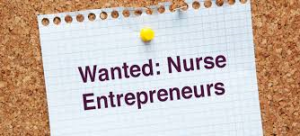
When I speak about a lived reality, I am not just talking about the physical structure, materials, and equipment or insertion of technology in the assistance; I am talking about patient experience, which is one of the most discussed subjects at the moment. How can I improve the patient experience with the assistance of my team? Is it possible? Yes, it is! Here is an example, where innovation was allied with humanization: a project called “Cinema in the Nursery” was developed in a hospital. Patients with immunological conditions are gathered every week in an improvised movie theater in the hospital and allowed to have popcorn and juice. This action is multi-professional, coordinated by nurses, intending to relieve stress due to the period of hospitalization and improve the patients’ quality of life.
Innovation and entrepreneurship are growing within the nurse profession, which increase needs to disseminate perspectives of actions and instill the interest of nursing professionals to develop their potential and explore new professional scenarios.
About the author: Bruna Nadaletti is a volunteer at Hacking Health Santa Catarina and a Nurse with a specialty in Adult Intensive Care. Bruna owns a Master in Education.
We count several nurses within the Hacking Health movement. Read the articles included in this article and watch the video to learn more about being a nurse-entrepreneur:


